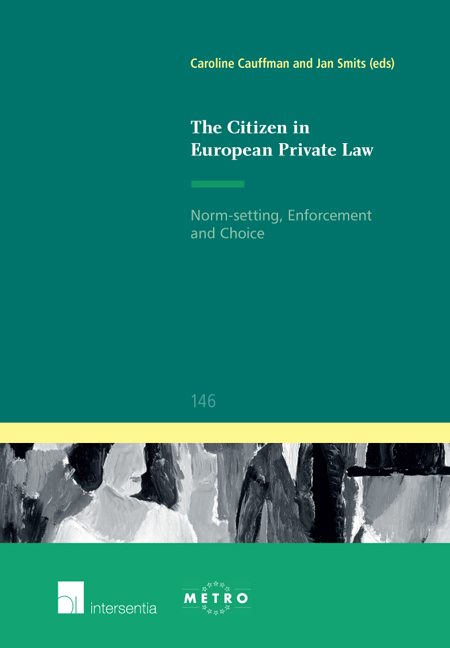Book contents
- Frontmatter
- Contents
- List of Authors
- List of Abbreviations
- Preface
- Introduction
- Part I Choice and Regulatory Competition
- Part II Norm-Setting and Enforcement
- Private Actors as Norm-Setters through Choice-of-Law: The Limits of Regulatory Competition
- Private Norm-Setting in Family Law, More Specifically: Private Norm-setting amongst Religious Communities in Family Law Issues
- Enchained Marriages: Is there a Way out?
- An Introduction to Alternative Dispute Resolution (ADR) for Consumers in Europe
- Critical Remarks on the ADR Directive
- Normative Frameworks in Commercial Dispute Resolution: The Role of Legal and Non-legal Norms in Mediation and Adjudication
- Law or Social Ordering: A Choice for Commercial Parties in Dispute Resolution? A Comment on Kornet
- Ius Commune Europaeum
Enchained Marriages: Is there a Way out?
from Part II - Norm-Setting and Enforcement
Published online by Cambridge University Press: 21 September 2018
- Frontmatter
- Contents
- List of Authors
- List of Abbreviations
- Preface
- Introduction
- Part I Choice and Regulatory Competition
- Part II Norm-Setting and Enforcement
- Private Actors as Norm-Setters through Choice-of-Law: The Limits of Regulatory Competition
- Private Norm-Setting in Family Law, More Specifically: Private Norm-setting amongst Religious Communities in Family Law Issues
- Enchained Marriages: Is there a Way out?
- An Introduction to Alternative Dispute Resolution (ADR) for Consumers in Europe
- Critical Remarks on the ADR Directive
- Normative Frameworks in Commercial Dispute Resolution: The Role of Legal and Non-legal Norms in Mediation and Adjudication
- Law or Social Ordering: A Choice for Commercial Parties in Dispute Resolution? A Comment on Kornet
- Ius Commune Europaeum
Summary
Introduction
In October 2013, many were surprised by the news that two American rabbis forced at least 50 men at gunpoint to divorce their wives. As such, this is not an unusual behaviour: gunpoint marriages and gunpoint divorces are well known throughout American legal history. But seemingly not only in the United States, in July of that year a Karachi Muslim claimed that his in-laws forced him at gunpoint to divorce his wife by talāq.
Why do people use criminal acts to force somebody to perform certain acts of family law? Is in their opinion such a family act of greater importance than noncriminal behaviour?
According to Jewish law, divorce is realised by the handing over of a divorce letter, the get, which the man ‘by his own free will’ has to transmit in the hands of his wife. According to Jewish law ‘by his own free will’ does not mean: ‘at his own discretion’, but ‘obeying the Torah’. But as the Torah leaves the man wide discretion in the choice of whether or not to divorce his wife, it often means that for a long time the wife will be caged in a de facto dead marriage. Such a Jewish wife is called an agunah, an enchained woman. She is, in my view and that of many others, in a morally unacceptable position, especially since according to the Torah she, from her side, has barely any opportunity to end her marriage.
In Islamic law, divorce law is less uniform. Shari'a divorce law differs between the different schools of Islamic law, in which the Islamic world is divided intellectually and geographically. As in many if not all religions, in Islam men are much better off than women. Although all Shari'a schools allow a man to dissolve his marriage unilaterally by talāq, and fully at the man's discretion, many schools include a number of grounds for divorce that are open to the wife while others schools of Islam, like the Hanafi school that prevails in e.g. Pakistan, are really very restrictive in their options for women to divorce.
But why should we, as members of a secular society, make a fuss about religious law? The French revolution introduced the secular state principle with its separation of state and church. Since then state law should not interfere with religious law nor be bothered by religious law.
- Type
- Chapter
- Information
- The Citizen in European Private LawNorm-Setting, Enforcement and Choice, pp. 133 - 140Publisher: IntersentiaPrint publication year: 2016



